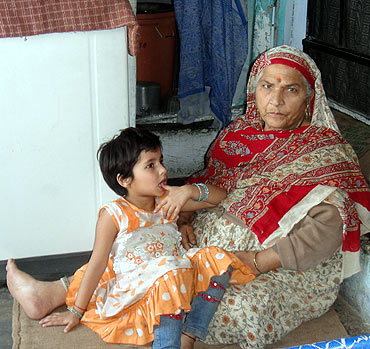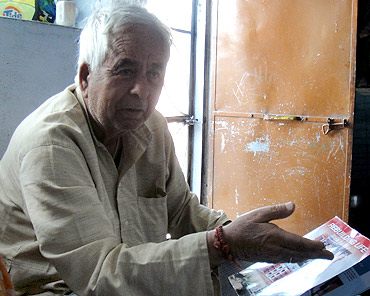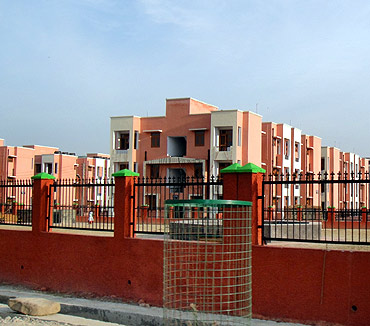
"We are puppets. We have to go where the government takes us. We are tourists in our (own) country," says a Pandit family that has lived in a temporary camp in Jammu for two decades since their escape from the Kashmir Valley.
The family will finally move into the new township constructed from the prime minister's special fund. Archana Masih reports on Kashmiri Pandits facing a third migration after they fled their homeland in the late 1990s. Part III of a special Rediff.com series.
Part I: A House for Mr and Mrs Raina
Part II: 'Is there no place for Pandits in this nation?'
'I feel nothing but hatred for anything Kashmiri. This is the Kashmir we had nurtured with our blood and look how they hated us. Wasn't what we experienced a genocide?" asks Ravi Below, his infant son wailing in the crook of his arm.
His four little children and wife share their home in the Mishriwala camp in Jammu city. The house is in bad shape, they say, the roof is dripping, the floors have cracked and the tin doors are susceptible to electric shock due to faulty wiring. The hand pump near their home hasn't worked for four months.
 |
State Relief Commissioner Vinod Kaul, however, clarifies that there is running water supply to every home.
When Triloknath Below, Ravi's father, was told that the prime minister was going to give him an apartment, he thought he would receive the keys and apartment number but was disappointed to only receive an allotment certificate. He does not know when exactly he will be moving into the new apartment, whether his grandchildren should continue in the same school or withdraw and take admission near the new Jagti township they will move to.
The new township will have a school, hospital, community hall, water supply facility, gardens and will house those who have continuously lived in camps since their escape. Relief Commissioner Kaul points out that the families will be moved by the end of April to the completed apartments. While 2,112 are nearing completion, the first phase of 2,112 apartments has been completed.
Ravi Below runs a small grocery shop, stocking Kashmiri herbs and dry vegetables that are staples for Pandit cuisine. He was 20, enrolled at the technical course when his family fled from Shopian, in western Kashmir. The family left with just a few bed-sheets. He says his father sold his land for lower than the market rate to get his sisters married.
"Now we don't have anything except our children. They are our future," says Ravi who is adamant that he will not teach his daughters the Kashmiri language. "What is the use of knowing our language? Let them learn Hindi, English, go abroad, build their lives."
...

He walks out of the house to show the common bathroom and toilet in his block. On each cubicle hangs a lock. One toilet is shared by four families, each family has its own key and is responsible for its cleaning.
He remembers his three-storeyed home, his apple, apricot and walnut trees. The quality of apples he now buys for Rs 60 ($1.40) or Rs 70 ($1.60) a kilo, were once only good enough for the cows, he says, and is angry with the government for not providing compensation for his property in Shopian.
 |
Compensation remains a contentious issue. Land belonging to the Pandits still remains in parts of Kashmir, says a political observer, but the state cannot provide them full and complete compensation for it because it will mean that they have conceded that the Pandits will not return.
"No government can do that to the Pandits who are the native inhabitants of Kashmir. It will be politically incorrect," he says.
Below sits on the step, with his mother beside him. Traditional gold earrings worn by Pandit women adorn her ears. He says the toll has been worse on the elderly. An ageing man, Below reveals, who recently died in another camp recalled his days in his native village in the weeks before his death.
"It was as if his memory had reverted back to those days. My parents mumble about the people they once knew in their sleep. Our population has reduced by 30 percent, our death rate is high while the birth rate is low. This is because of the trauma we have faced," he says.
"The Pandits always supported the Congress and the Congress only ruined us," says Below's father Triloknath.
He points out that no federal minister since Rajesh Pilot has visited their camp, even Omar Abdullah last came before he became chief minister. The aged patriarch, who had to leave his home in 1990, says he would love to return but only if a homeland was created for them with the central government's support because he had no faith in the state government.
...

'No one cares for us because we have no voice. We are not a vote bank. When we were in Kashmir, the Muslims discriminated against us, here the Dogras discriminate (against) us," interrupts his son Ravi who feels that because the state government did not provide age relaxation for Pandits who were over-age for government jobs, many like him had lost out.
He says since his family once earned Rs 100,000 (approximately $2,200) yearly from their orchards, "the government should return us Rs 20 lakh (Rs 2 million/approximately $44,400) for all these years, that will help us build a new life for our children at least."
 |
It is lunch time and he has to get back to his shop.
Outside, the March sun is already scorching. Pointing out the names of Kashmiri herbs and dry vegetables in his shop, he speaks with warmth about the provisions he stocks which form part of Pandit life in these camps.
He does not know what he will do for a living in the new township because it will not be possible to travel the distance to the current shop. Moreover, once the camps are emptied, there will be no customers here either.
"Talking about our life I feel as if a lid has been removed from my chest," says Ravi, "The pain is like a bomb blast."
...

Towards the edge of the vast Purkhoo camp lives Beharilal Kheda from Baramulla district in northwest Kashmir. That morning, his daughter who lives with her family in a rented house elsewhere, has come to visit him after attending a marriage on her husband's side of the family.
Kheda sits on the rug spread on the floor of his home, which appears more spacious than other homes in the camp. The family has built a small kitchen outside and offers us lunch.
Hailing from a village that once had 50 or 60 Pandit homes, the family left one night after a Pandit was murdered in the neighbouring village and a temple demolished.
 |
His friendly daughter speaks about those days when they lived with 30 other Pandit families in a shelter, each family separated by only a curtain. They lived that way for seven years.
"I was just a little girl when we left our village but I remember everything about my village. Everything!" stresses Sunita, her smile tinged with grief.
"I would love to go back, but know that we cannot. It can never be the same again."
She feels the government should also think about Pandit families who do not live in the camps but have been staying in rented accommodation in the city. And also about other refugees from Pakistan occupied Kashmir (she refers to the mostly Sikh and Punjabi refugees from PoK) who live in different camps in the city. While the government is providing apartments for Pandits living in the camps, similarly they should think about other displaced people too, she says.
"We are puppets. We have to go where the government takes us. We are tourists in our (own) country. Our status is worse than refugees."
Her father sits besides her listening to what his daughter has to say. He smiles, especially when she mentions her memories of their village. Their triple-storeyed former home. Their apple, walnut and almond trees. That life that they were forced to forsake one night forever.
"In my time you could get 100 walnuts for Rs 10," says Beharilal Kheda. "Now one walnut costs Rs 4."
He barely finishes when his daughter interrupts, "Our children think apples and snow come from inside the fridge. What do they know that in our village we used to pluck apples from our trees and play in the snow outside our door?"
The Kheda family will move to the government allotted apartment in a few days but their longing for home, the real home, remains unfulfilled.